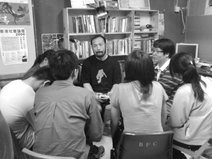高考专题之:“大我”到“小我”——三十年高考作文题变迁
作者:一格
请以“我在这战斗的一年里”为题,写一篇作文——如果不详加说明,你也许会以为这是某届全国“新概念”作文大赛的试题。在语文教育提倡发散思维和语言创新的今天,这样一个题目,足够作者们大笔一挥,写出些颇具魔幻现实主义风格的作品。其实,这是1977年恢复高考后第一次语文考试的作文题目——忽然间,你也许嗅到了那字里行间所残留的一息革命味道。
高考恢复已经三十年,回顾一下这几十个作文题目,是一件有趣的事情。当我们这批新世纪成长起来的中学生已经习惯了“话题作文”这种由一点出发,联系实际(其实就是天马行空,不着边际)的模式时,冷不丁写一写“先天下之忧而忧,后天下之乐而乐”(1982年全国卷)或者“理论对实践的指导意义”(1987年全国卷)这样的准八股文,还真是有点儿不太适应。反过来,如果让那些当年参加高考的叔叔阿姨们来写“假如记忆可以移植”(1999全国卷)和“燕子减肥”(2006江西卷),恐怕他们一时半会儿也有点儿摸不着头脑。
是的,高考年年变革,大纲岁岁更新,三五年也许不觉得什么,可是整整三十年一晃,长长的一张作文单子看下来,忽然发现,我们已经从河东渡到了河西——从意识形态刚刚开始松动时候的准八股,到改革开放初期的价值观大讨论,到世纪末充满后现代色彩的多元文化兴起,直至各地方各自为营后的百花齐放——一幅刻画当代社会文化心理的斑斓画卷,就随着这一串文题,徐徐展开了。
最明显的一个变化,是“自我意识”的从无到有。这个发展大致可以分为三个阶段。
首先,是70年代末到90年代前期,题目大多是外展性质的,关注一些宏大的、抽象的主题。比如前面举例谈到的“先天下之忧而忧”,以及“速度问题是一个政治问题”(1978年全国卷)、“对中学生作文的看法”(1984全国卷)、“代表学校给《光明日报》写信反映环保问题”(1985年全国卷),“近墨者黑/近墨者未必黑”(1991全国卷)。
到了90年代中后期,对想象力和创造力的考察逐渐增多,出现了“尝试”(1994全国卷)、“鸟的对话”(1995全国卷)、“假如记忆可以移植”(1999全国卷)、“答案是丰富多彩的”(2000全国卷)等一系列在当时看来富有新鲜意义的题目。这一变革意味深长。因为对于想象力和创造力的强调不仅仅等同于提倡发散思维,更是对自我价值的一种启蒙。因为,在强调自我的“个人主义”(individualism) 价值观里,拥有丰富的想象力和拥有健康的身体一样,是个体独立性(independence)和自主性(autonomy)的基本保障。换句话说,对考生想象和创造的考察,其实质是一种个体意识的启动。虽然命题人未必有如此考量。我们不妨把这个现象理解为一种集体无意识的结果。
本世纪以来,高考改革步伐加快,各地纷纷独立命题,作文题目一下子变得五花八门。在这个新的阶段,作文形式以“话题作文”为主流,主题上,“自我”色彩十分突出。考生们可以谈情感(“遭遇挫折和放大痛苦”,2004),谈认知(“感情亲疏和对事物的认知”,2003),谈决策(“相信自己与听取别人的意见”,2004),谈自我和他者(“自我认识和他人期望”,2002;“看到自己与看到别人”,2004),谈 “心灵的选择” (2002)和“快乐幸福与我们的思维方式”(2004)……一下子,作文题成了心理学的天下。对于考生来说,自我,成为了被考量的主题。
那么,这是否意味着当今的中国已经进入了一个“个人主义”的社会了呢?
日裔美国文化心理学家D.松本把文化现象分为两类:文化世界观(cultural worldviews)和文化实践(cultural practices)。前者体现在人们的思维模式和语言表达中,而后者则落实在具体行动上。对个体而言,这两个文化的层面虽然相关,但未必相符。比如说,中国人常挂在嘴边上的“忠义诚信”,是本民族的普适价值观,然而观察人们的实际行动,却不乏背信弃义之举。如此“厚黑”之学,可以看作是一种世界观和实践的脱节。因此,我们分析文本所得出的结论,只能部分反映社会现实,看到一种文化心理的变化趋势;但是这绝不等同于现实。正如一个人在回答一份调查问卷的时候,会无意识地更偏向于选择“社会所期望的答案”,一个社会文化心理的变化,也有可能是朝着一个该社会群体更为认同的方向变化,而这种方向上的偏转,很可能先于社会习俗和制度的转变。具体一点说,20世纪八十年代以来,中国社会对欧美个人主义价值观有着一种很高的认同,这从根源上说应该是对现代性本身的一种认同。于是,出生并成长于那个年代的我们,从小就被灌输,要做有个性、独立的人。但同时,我们固有的社会文化强调的是集体利益高于一切,是人与人之间十分强的互赖性和互相比较。一时间,两种力量交错,人们把这种矛盾内化,出现许多有意思的现象。我个人感触最多的,就是很多同辈人一方面独立自主,把个人利益看得很重,另一方面又无法忽略和他人的互相比较,非常在乎群体对自己的看法。
“小我”在高考作文中越来越频繁的呈现,一方面预言了一个“个人主义”时代的来临,另一方面,也掩盖了固着于社会心理中的一些传统价值。文化之于社会,正如记忆之于个人。当我们意识到这一点的时候,很多单薄的文本,便不再单薄。
高考作文的优劣功过另当别论。单就他的变迁来说,着实含义不少。“自我”的变化,不过其中之一。同理,当看到越来越多“安”与“幸福”的字眼跃然纸上的时候,你是否想过,这是一种现实的写照,还是一个善意的“愿景”呢?

6 条评论:
阿 文章在我觉得马上要开始精彩的地方戛然而止了。。。
小失落
写的不错啊!
就说了一件事,让我写我就写不出这么长.
thank you very much for this interesting post! The only critique I can give is the base of your periodization is somewhat homogeneous, as you state that it is a passage to individulism, I do think it is partially true but it is much more complicated, and it would be great if you can approximate this assemblage instead. Moreover the 70-90s is a bit too general.I will have another interpretation, for example 70s is very political,"the question of speed is a question of politics"(1978), I think it is interesting in the sense that it is apparently influenced by the the Marxist thought at the time, it was a fashion of the French Marxist philosophers. 80s is more on economics, so some questions are related to development. 90s, I will see the impact of the biotech and computer technology, there is a rethink of the ethics. it is true to it is more individual but hard to claim it as individualiSM. In the recent years, I think they are more on communities instead of individualism, for example "on decision making","on self and others", in other words it is an ideological resistant to the idea of individual. In general I think they reflect an assemblage of particular situation,response of government towards specific milieu,and etc. anyway, a very interesting work!
Hey Yuk,
thanks for your interesting comment! Yes, my analysis using the COL-IND framework is not able to cover the whole picture in this issue. And your interpretation from another perspecitive makes sense in general, esp. the point that there is an emphasis on communities and "harmony" these years.
After the monument for the victims of socialism established in Washington D.C., i think it is really the time to rethink of the dichotomous tradition in both academics and politics. For IND-COL per se, it is an ideological dichotomy, and I prefer not to use it much in interpreting public issue.
btw, what i want to argue in this article is exactly that instead of an artificial legitimacy of individual independence and autonomy in contemporary China (cultural worldviews of some Chinese ppl, esp. the post-80's), the reality in which most chinese ppl are living in, is still bounded in the practice of collective or communal unity.
yes,I can see as you state in the last third paragraph. but still I think it is more complicated, since a community doesn't necessarily imply a "collective unity "per se. To make it clear there are two forms of community(maybe more,but in terms of the philosophical inquiries of our case, I take it two here). Firstly Hegel's spiritual unity of the community, which is linked to a representational politics, secondly, an imagined community, where there are singularities instead of individuals, where the others are recognized and constitute the formation of the self, see Levinas/Jean-Luc Nancy/Blanchot,etc critisize the comprehension of being in general in Martin Heidegger's Being and Time. So I think the struggle of the state towards a politics of community has to be articulated in two directions, there is a politics of reducing the sigularities into the homogeneous "people", as what you call the collective or communal unity and an attempt of restoring a morality, through which the other is recognized. For the second point, it makes sense if we see it as a response to our generation which has been critisized of being too inconsiderate.
发表评论